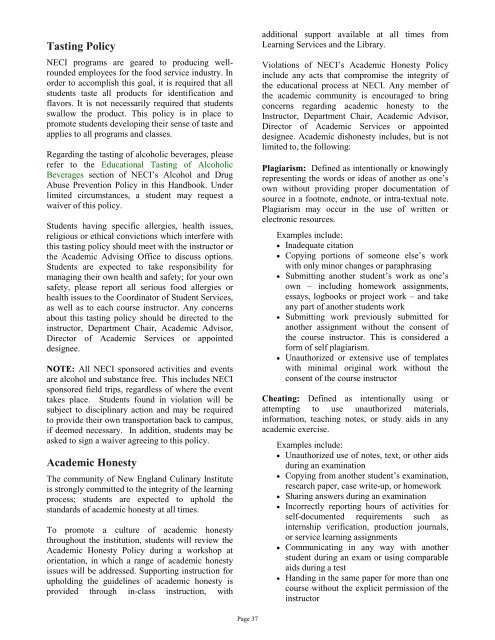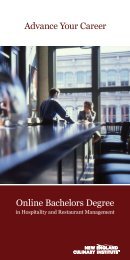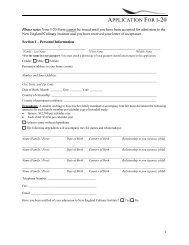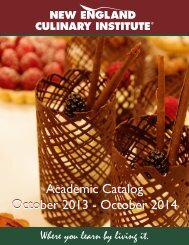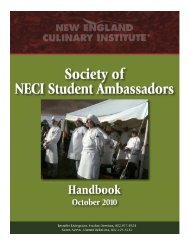Student Handbook - New England Culinary Institute
Student Handbook - New England Culinary Institute
Student Handbook - New England Culinary Institute
You also want an ePaper? Increase the reach of your titles
YUMPU automatically turns print PDFs into web optimized ePapers that Google loves.
Tasting Policy<br />
NECI programs are geared to producing wellrounded<br />
employees for the food service industry. In<br />
order to accomplish this goal, it is required that all<br />
students taste all products for identification and<br />
flavors. It is not necessarily required that students<br />
swallow the product. This policy is in place to<br />
promote students developing their sense of taste and<br />
applies to all programs and classes.<br />
Regarding the tasting of alcoholic beverages, please<br />
refer to the Educational Tasting of Alcoholic<br />
Beverages section of NECI’s Alcohol and Drug<br />
Abuse Prevention Policy in this <strong>Handbook</strong>. Under<br />
limited circumstances, a student may request a<br />
waiver of this policy.<br />
<strong>Student</strong>s having specific allergies, health issues,<br />
religious or ethical convictions which interfere with<br />
this tasting policy should meet with the instructor or<br />
the Academic Advising Office to discuss options.<br />
<strong>Student</strong>s are expected to take responsibility for<br />
managing their own health and safety; for your own<br />
safety, please report all serious food allergies or<br />
health issues to the Coordinator of <strong>Student</strong> Services,<br />
as well as to each course instructor. Any concerns<br />
about this tasting policy should be directed to the<br />
instructor, Department Chair, Academic Advisor,<br />
Director of Academic Services or appointed<br />
designee.<br />
NOTE: All NECI sponsored activities and events<br />
are alcohol and substance free. This includes NECI<br />
sponsored field trips, regardless of where the event<br />
takes place. <strong>Student</strong>s found in violation will be<br />
subject to disciplinary action and may be required<br />
to provide their own transportation back to campus,<br />
if deemed necessary. In addition, students may be<br />
asked to sign a waiver agreeing to this policy.<br />
Academic Honesty<br />
The community of <strong>New</strong> <strong>England</strong> <strong>Culinary</strong> <strong>Institute</strong><br />
is strongly committed to the integrity of the learning<br />
process; students are expected to uphold the<br />
standards of academic honesty at all times.<br />
To promote a culture of academic honesty<br />
throughout the institution, students will review the<br />
Academic Honesty Policy during a workshop at<br />
orientation, in which a range of academic honesty<br />
issues will be addressed. Supporting instruction for<br />
upholding the guidelines of academic honesty is<br />
provided through in-class instruction, with<br />
additional support available at all times from<br />
Learning Services and the Library.<br />
Violations of NECI’s Academic Honesty Policy<br />
include any acts that compromise the integrity of<br />
the educational process at NECI. Any member of<br />
the academic community is encouraged to bring<br />
concerns regarding academic honesty to the<br />
Instructor, Department Chair, Academic Advisor,<br />
Director of Academic Services or appointed<br />
designee. Academic dishonesty includes, but is not<br />
limited to, the following:<br />
Plagiarism: Defined as intentionally or knowingly<br />
representing the words or ideas of another as one’s<br />
own without providing proper documentation of<br />
source in a footnote, endnote, or intra-textual note.<br />
Plagiarism may occur in the use of written or<br />
electronic resources.<br />
Examples include:<br />
• Inadequate citation<br />
• Copying portions of someone else’s work<br />
with only minor changes or paraphrasing<br />
• Submitting another student’s work as one’s<br />
own – including homework assignments,<br />
essays, logbooks or project work – and take<br />
any part of another students work<br />
• Submitting work previously submitted for<br />
another assignment without the consent of<br />
the course instructor. This is considered a<br />
form of self plagiarism.<br />
• Unauthorized or extensive use of templates<br />
with minimal original work without the<br />
consent of the course instructor<br />
Cheating: Defined as intentionally using or<br />
attempting to use unauthorized materials,<br />
information, teaching notes, or study aids in any<br />
academic exercise.<br />
Examples include:<br />
• Unauthorized use of notes, text, or other aids<br />
during an examination<br />
• Copying from another student’s examination,<br />
research paper, case write-up, or homework<br />
• Sharing answers during an examination<br />
• Incorrectly reporting hours of activities for<br />
self-documented requirements such as<br />
internship verification, production journals,<br />
or service learning assignments<br />
• Communicating in any way with another<br />
student during an exam or using comparable<br />
aids during a test<br />
• Handing in the same paper for more than one<br />
course without the explicit permission of the<br />
instructor<br />
Page 37


